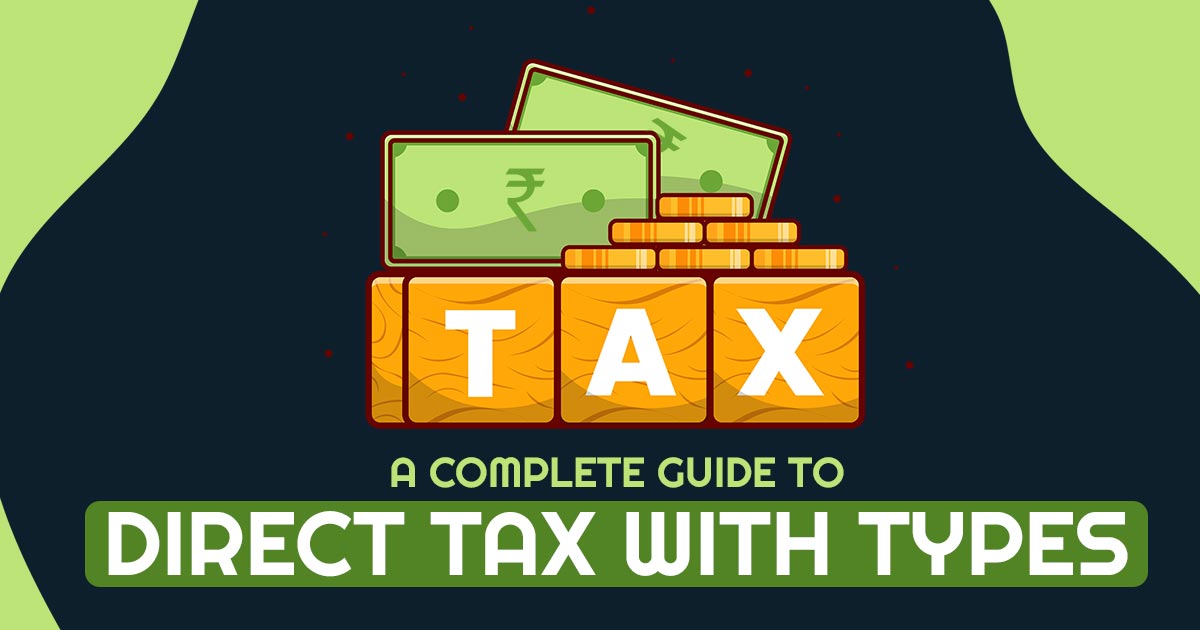
What is Direct Tax?
These types of taxes are directly paid to the government of India. The government levies a direct charge on the entity or an individual, which has to be borne directly by the individual/entity. Direct taxes include several taxes such as income tax, TDS, etc.
Types of Direct Taxes in India
There are several types of direct taxes available in the Indian Constitution Bill. We define below:
A. Income Tax:
This tax is well-known in India. This tax is paid by the taxpayer whose income exceeds the taxable limit. The taxpayers have to pay tax at applicable rates. As per the income tax rate, you do not have to pay income tax if your income is up to INR 2,50,000. But if your earnings exceed 2.5 lakhs, then you have to pay 5% tax as income tax up to INR 5 lakhs of Income. A rebate of 12500/- is available for total income up to 5 lacs.
B. Capital Gains Tax:
Capital gain tax is the tax that has to be borne by the individual/entity at the time of sale of any capital asset, for instance, property, shares, bonds, valuable material, etc. It is levied on the difference between the sale price and purchase cost (or indexed cost).
Capital gain can be long-term or short-term based on the holding period of the capital assets. For instance, for immovable property, if the holding period is greater than 24 months, then it will be treated as a long-term capital gain.
The tax rate for short-term and long-term capital gains differs based on their nature.
C. Securities Transaction Tax:
Securities transaction tax (STT) was introduced in the 2004 Union Budget and came into effect on 1 October 2004. The basic motive behind the introduction of the Securities transaction tax (STT) was to curb the evasion of taxes on profits from capital gains earned by transacting in securities. This tax is levied at the time of purchase and sale of securities listed on stock exchanges in India. The rate of STT differs based on the type of security traded and whether the transaction is a purchase or a sale.
D. Fringe Benefits Tax:
Tax paid on fringe benefits provided by the company to employees. This is separate from income tax and is calculated on the taxable value of the fringe benefits provided.
E. Corporate Tax:
The corporate tax, also called corporation tax, is levied on the income of corporate bodies in our country. In India, taxation companies are divided into international and domestic companies.
Direct Tax Code
The Direct Tax Code or DTC was drawn to substitute the Income Tax Act of 1961. The major purpose of DTC would be to develop an equitable, effective, and efficient direct tax system. DTC shall be made to revise and stabilise the statutory concerned to direct taxes so that the tax GDP ratio shall surge and voluntary compliance would get simpler.
Elaboration of the Direct Tax Code
The major specifications of the Direct Tax Code are clarified below:
- All direct taxes would be secure with the single code – By drawing all the direct taxes beneath one code, a single unified assessee system could be put into force. All the specifications of compliance could be unified beneath one code.
- Stability – In the present times, as per the Finance Act of the relevant year, the taxes made. But beneath the direct tax code, the rates of tax would be made between the first and fourth schedules of DTC. any revision in the schedule could be incurred by issuing the amendment bill to the parliament.
- Constant litigation problems have been removed – Tracking the code so that it does not get misused or misinterpreted to prevent contradiction and ambiguity.
- Removing the statutory operations – Additional statutory heads should manage all statutory operations
- Flexibility – A law has been made for the amendments and the need to enhance the economy could be accommodated without securing to make the changes on consistent grounds.
- Fringe benefits tax – The tax would get imposed on employees instead of employers.
Advantages of Direct tax
The major benefits of direct taxes in India would have been specified below:
- Economic and Social balance – The Government of India has incorporated well-balanced tax slabs relying on the person’s earnings age. The tax slabs would indeed be revealed as per the economic conditions of the country. The exemption would be set so that all the inequalities of income get balanced.
- Inflation is restrained – While inflation is rising the tax has been surged by the government. The rise in taxes diminishes the requirement for the goods and services rendered to the inflation to be reduced.
- Productivity – The returns via direct taxes shall surge if there is a rise in the number of people who work and the community.
- Equal distribution of wealth – Higher taxes would get levied via the government to the person or companies which could afford them. The surplus money would be utilised to support the poor along with the below-poverty-line societies in India.
- Certainty – Certainty might arise from the government and assessee because of the presence of direct taxes. The amount is mandatory to get furnished and the amount that should be collected is called via the assessee and the government, respectively.
Despite there being some disadvantages direct taxes would play an essential role in India’s economy. When these taxes are imposed effectively then they can perform a bigger role in making the price constant and stopping inflation.
See Also: Indirect Taxes